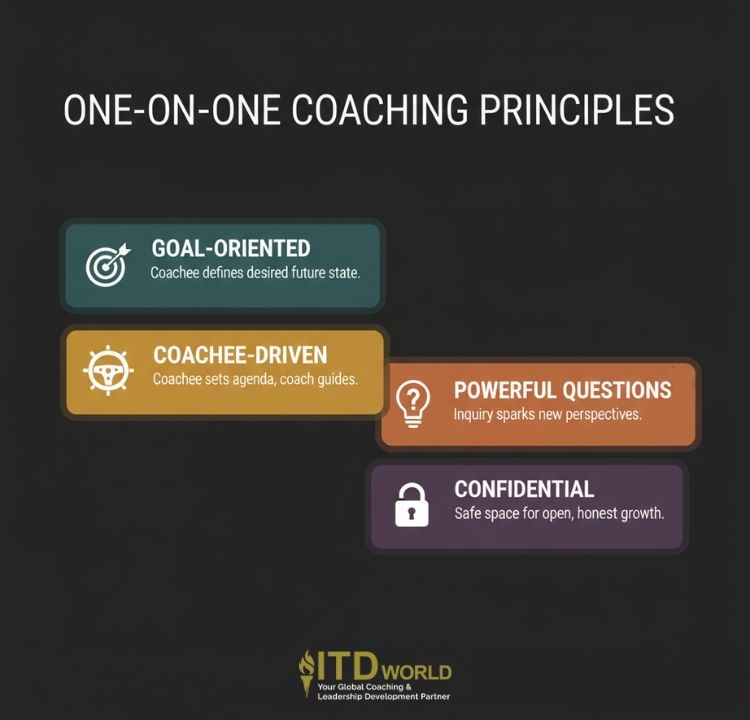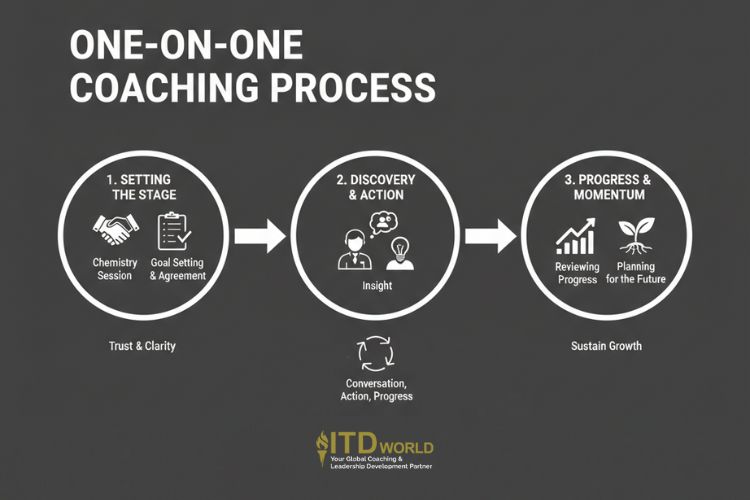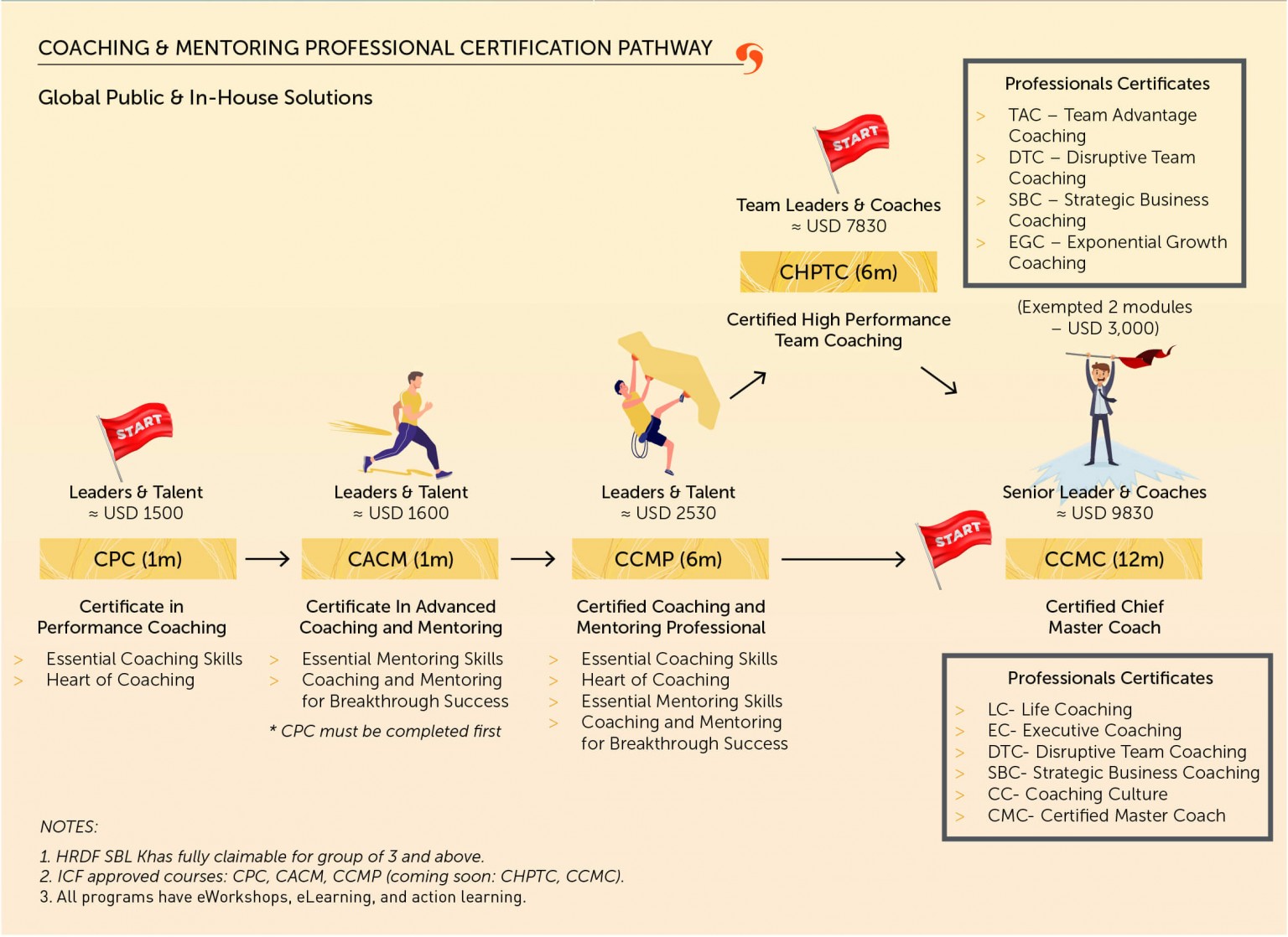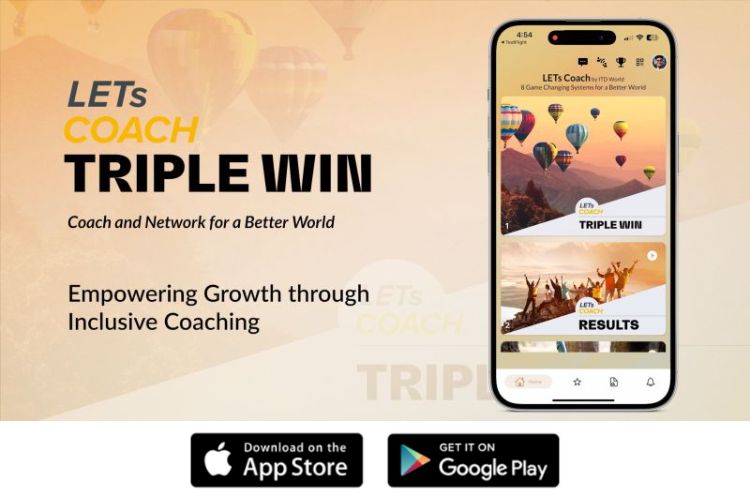Explore the benefits of one-on-one coaching, when to consider it, plus actionable advice to create truly transformational outcomes.
What do the world’s most successful executives, innovators, and leaders have in common? They understand that peak performance is not achieved in isolation. In a business context, one-on-one coaching is the ultimate tool for high-potential leaders to sharpen their skills, gain new perspectives, and navigate their most critical challenges. It is a strategic partnership designed to turn “good” into “great” and unlock new levels of effectiveness and impact.
|
Author: Jonathan M. Pham |
Highlights
- One-on-one coaching is a confidential, goal-oriented partnership where a trained coach uses powerful questions to help an individual unlock their potential and achieve personal and professional goals.
- One-on-one coaching in the workplace is a high-impact investment that boosts individual self-awareness, decision-making, and confidence, while also strengthening leadership capabilities, increasing employee engagement and retention, and improving overall team and organizational performance. It is the preferred development solution in high-stakes situations like senior executive development, critical performance gaps, or major career transitions.
- A one-on-one coaching engagement is a structured journey that begins with a “Chemistry session” and goal-setting, followed by core sessions where the coach facilitates insight through questions and deep listening while the coachee drives the agenda and takes action, concluding with a review of progress and planning for sustained growth.
- Effective one-on-one coaching is a co-created success relying on the coachee’s commitment to preparation, honesty, openness to challenge, and follow-through; the coach’s dedication to professional excellence, partnership, and confidentiality; and the organization’s role in defining clear objectives, ensuring a good coach-coachee fit, and championing the process.
What is One-on-one Coaching?
At its core, one-on-one coaching (also referred to as 1-on-1/ personalized/ individual coaching) is a confidential, thought-provoking, and creative partnership between a trained coach and an individual (the coachee) that inspires them to maximize their personal and professional potential. It is a highly personalized development process aimed to enable people to produce extraordinary results in their lives, careers, and businesses.
To truly understand its value, it is essential to distinguish coaching from other forms of support:
- It is not therapy. While therapy tends to explore the past to heal and resolve deep-seated issues, coaching is fundamentally future-focused. It is oriented around helping a coachee get from where they are to where they want to be.
- It is not consulting. A consultant is an expert hired to provide specific answers and solutions. A coach, in contrast, is an expert in the process of discovery. They don’t give answers; they ask questions to help the coachee unlock their own answers and insights.
Every effective one-on-one coaching engagement is defined by a set of core principles that make it a uniquely powerful tool for development:
- Goal-oriented: The process is anchored to a specific, desired future state or goal defined by the coachee at the beginning of the engagement.
- Coachee-driven: The coachee sets the agenda for each session and is ultimately responsible for the work. The coach is a guide and accountability partner, but the coachee is always in the driver’s seat of their own journey.
- Built on powerful questions: A coach’s primary tool is inquiry. They ask questions designed to challenge assumptions, spark new perspectives, and allow the coachee to see their situation with greater clarity.
- Completely confidential: This creates a space of deep psychological safety, allowing the coachee to be open, vulnerable, and honest without fear of judgment – a condition essential for real growth.

Common Domains of One-on-one Coaching
One-on-one coaching is a flexible and adaptable process that can be applied to a wide range of professional and personal objectives. Some of the most common domains include:
- Executive and leadership coaching: For senior leaders navigating organizational complexity, enhancing their influence, and strengthening their executive presence.
- Strategic coaching: Helping leaders and teams develop their strategic thinking capabilities, formulate business strategy, and align actions with long-term goals.
- Business coaching: Typically geared towards entrepreneurs, business owners, and sales leaders, focusing on improving overall business performance, growth, and profitability.
- Performance coaching: For individuals looking to improve their results and effectiveness in their current role or overcome a specific professional challenge.
- Skills-based coaching: For cultivating a particular competency, such as public speaking, negotiation, delegation, or time management.
- Career coaching: For professionals navigating a career transition, seeking a promotion/ more visibility, or looking for greater fulfillment in their work.
- Life coaching: Focusing on personal goals, improving well-being, and achieving a greater sense of balance, purpose, and fulfillment in life.

One-on-one coaching model
Read more: 7 Types of Coaching in the Workplace – A Practical Guide
The Importance of One-on-one Coaching in the Workplace
The decision to invest in one-on-one coaching is driven by its proven ability to deliver significant, measurable returns. It is a high-impact intervention that creates a powerful ripple effect, benefiting not just the individual being coached but their team and the entire organization.
The business case is compelling. According to a study by the International Coaching Federation (ICF), companies that invest in coaching may expect an average return of seven times their initial investment. This significant ROI is a direct result of the tangible improvements in performance, productivity, and retention that coaching fosters.
For the individual: A catalyst for personal growth
- Increased self-awareness: Coaching provides a unique and objective mirror, helping individuals identify blind spots in their leadership style and understand the true impact of their actions on others.
- Improved decision-making: The coaching process, which is built on challenging assumptions and exploring multiple perspectives, inherently strengthens an individual’s critical thinking and problem-solving skills, leading to more thoughtful and effective decisions.
- Enhanced confidence and resilience: By setting and realizing meaningful goals throughout the coaching engagement, individuals acquire a powerful sense of self-efficacy and the mental fortitude to navigate future challenges with greater confidence.
For the organization: A driver of business performance
- Stronger leadership capabilities: Coaching is one of the most effective ways to cultivate the specific leadership competencies that matter most. A study found that combining coaching with training can increase productivity by up to 88%, compared to just a 22% increase from training alone.
- Higher employee engagement and retention: When an organization invests in its people, it sends a powerful message that they are valued – thereby boosting morale, loyalty, and engagement. Coaching is directly linked to higher retention rates for key talent, saving the organization significant costs associated with recruitment.
- Improved team performance: An effective leader creates an effective team. As leaders improve their communication, delegation, and empathy skills through coaching, their teams become more aligned, more motivated, and ultimately, more productive.
Our talent and top leaders have shown significant improvement in the areas of strategy and goals alignment, collaboration, passion and results-orientation. We have been able to overachieve on our bottom-line business breakthrough goal.
Lars-ake Norling, Chief Executive Officer, Dtac (Part Of Telenor Group, Norway)
Group vs Individual Coaching: Which One to Choose?
While both formats share a foundation of being goal-oriented and facilitated by a trained coach, their structure, focus, and outcomes differ significantly.
| Aspect | One-on-One Coaching | Group Coaching |
| Focus | Deeply personalized and customized to one individual’s unique goals and challenges. |
A common theme, skill, or goal shared by all members of the group (e.g., developing coaching skills for managers).
|
| Pace | The pace is driven entirely by the individual coachee’s needs, progress, and agenda. |
A structured pace and curriculum that moves the entire group forward together over a set period.
|
| Confidentiality | Extremely high. The private nature of the relationship creates a secure and safe space for discussing sensitive topics. |
Limited. Confidentiality is based on a group agreement, and discussions are shared among all members.
|
| Key benefits | Deep, targeted personal transformation and confidential problem-solving for complex issues. |
Peer learning, shared experience, networking, and a cost-effective way to develop a team.
|
When to choose one-on-one coaching
This highly personalized format is the ideal choice in specific, high-stakes situations:
- For senior executive development: C-suite leaders face unique, complex, and highly sensitive challenges that are best addressed in a completely confidential, bespoke environment.
- To address a critical performance gap: When a key leader or high-potential employee needs to urgently develop a specific skill or overcome a particular obstacle that is impacting their performance.
- For navigating significant career transitions: When an individual is preparing for a major promotion, taking on a significantly larger role, or navigating a critical career crossroads.
When to choose group coaching
Group coaching is an excellent and efficient solution when the development goals are shared across a team or cohort:
- To develop a common skill across a team: It is perfect for equipping a specific group – such as all new managers or a sales team – with a consistent set of skills, like giving effective feedback or improving client communication.
- To build peer relationships and foster collaboration: The group format naturally builds a strong peer support network, helping to break down silos and foster a sense of community among a leadership cohort.
- As a scalable and cost-effective solution: Group coaching allows an organization to provide the benefits of a structured coaching experience to a larger number of employees with a more accessible budget.
The Process of One-on-one Coaching
For those new to the experience, one-on-one coaching may sometimes feel like a “black box.” However, rather than an aimless series of conversations, it is a structured and purposeful journey with distinct phases.
-
The foundation – Setting the stage for success
The initial phase is critical for building the trust and clarity needed for the entire engagement. It typically involves two key steps:
- The “Chemistry” session: Before any commitment is made, there is usually a complimentary introductory meeting. This “Chemistry session” is a crucial opportunity for both parties to get to know each other, discuss the coachee’s goals, and determine if their personalities and styles are a good fit. A strong, trusting rapport is the bedrock of any successful relationship.
- Goal setting & agreement: Once a partnership is formed, the first official session is dedicated to laying the groundwork. This includes signing an agreement that outlines logistics, roles, and a firm commitment to confidentiality. Most importantly, the coach and coachee work together to transform broad aspirations into clear, specific, and measurable goals for the engagement.
Example: A leader might start with a general feeling of being “overwhelmed.” Through the goal-setting process, this could be refined into a concrete objective, such as: “Over the next six months, I will develop and implement a new delegation framework for my team that reduces my direct involvement in operational tasks by 25%, freeing up one full day per week for strategic planning.”
-
The core sessions – The work of discovery and action
This is the heart of the journey, where the real work happens through a cycle of conversation, insight, and action. Each session is a collaborative effort with distinct roles:
- The coach’s role: To facilitate insight. As mentioned, the coach does not provide advice or answers. Instead, they utilize a specific skillset to facilitate the coachee to find their own solutions – i.e. asking powerful, open-ended questions, listening at a deep level to what is (and is not) being said, challenging limiting beliefs, and offering objective observations to help the coachee see their situation in a new light.
- The coachee’s role: To drive the agenda and take action. The coachee is responsible for bringing a specific topic or challenge to each session. They must be willing to be open, honest, and vulnerable to explore the topic fully. Crucially, their responsibility extends beyond the coaching call; they must commit to taking the specific actions they identify during the session to create real-world progress.
-
Measuring progress and sustaining momentum
As the coaching engagement nears its conclusion, the focus shifts to embedding the learning and ensuring continued growth.
- Reviewing progress: Both parties will formally review the progress made against the initial goals set – so as to quantify the value and impact of the coaching, celebrate the coachee’s achievements, and identify any remaining challenges.
- Planning for the future: A successful engagement empowers the coachee to become their own best coach. The final session is typically focused on coming up with a sustainable plan for the coachee to continue applying their new skills, mindsets, and habits independently long after the formal relationship has ended.

Tips for Effective One-on-one Coaching Sessions
A satisfactory outcome is not the sole responsibility of the coach. It is a co-created success that depends on the active commitment and mindset of a three-way partnership: the coachee, the coach, and the sponsoring organization. When each party understands and fulfills its role, the engagement is positioned to deliver maximum value and lasting impact.
For the coachee: Owning your growth
The coachee is the single most important driver of their own success. To get the most out of the investment of time and energy, one should embrace these commitments:
- Come prepared to every session: The most productive sessions occur when the coachee has reflected beforehand on a specific success, challenge, or goal they want to explore. This ensures that the limited time is focused and purposeful.
- Embrace honesty and vulnerability: Coaching is a confidential and safe space. Real breakthroughs happen only when a coachee is willing to be open about their true challenges, fears, and aspirations, allowing the coach to work with the real issues.
- Be open to being challenged: A great coach will challenge your assumptions and help you see your situation from new perspectives, which may sometimes feel uncomfortable. The best coachees welcome this as a catalyst for growth rather than resisting it.
- Do the work between sessions: The real change happens not during the one-hour coaching call, but in the days and weeks that follow. One’s commitment to applying their new insights and taking the agreed-upon actions is what turns conversation into tangible progress.
For the coach: The commitment to professional excellence
A professional coach operates under a strict set of ethical and professional standards designed to protect the coachee and maximize their potential.
- Maintain unconditional positive regard: The coach’s foundational belief is that the coachee is naturally creative, resourceful, and whole. They act as a steadfast champion of the latter’s potential, even when the person doubts themselves.
- Act as a partner, not a consultant: A professional coach must resist the urge to give advice or provide their own solutions. Their commitment is to the coaching process – facilitating the coachee’s own discovery and empowering them to find the answers that are best for them.
- Ensure absolute confidentiality: This is the non-negotiable bedrock of trust. What is discussed in a session is held in the strictest confidence. When reporting back to the organization, a coach will only share general themes or progress against mutually agreed-upon goals, never the specific, personal details of the conversations.
Read more: Why Follow Up is Crucial to Behavior Change & Leadership Effectiveness
For the organization (and HR): Creating the right environment
The sponsoring organization plays a critical role in creating the conditions for a successful engagement and maximizing its return on investment.
- Define clear business objectives: Before the engagement begins, the organization should be clear on the desired business outcome.
Example: Is the goal to improve a leader’s team retention rates, to prepare them for a C-suite role, or to help them successfully lead a major change initiative?
- Ensure a good fit: The organization’s role is not to assign a coach, but to provide a small, pre-vetted pool of qualified coaches and allow the coachee to choose the one with whom they have the best “Chemistry.”
- Champion the process: When senior leaders openly support coaching as a valuable tool for high-performers, it removes any potential stigma and encourages participants to fully engage in the process.
Read more: 10 Characteristics of a Good Coach

One-on-one Coaching Sample Questions
Below are sample questions categorized by common themes. You can use these for self-reflection before a session or as a starting point for a conversation.
Category 1: Gaining Clarity and Defining Vision
(Use these to define what you truly want to achieve)
- What does success look like for you in this area six months from now?
- If all obstacles were removed, what would you be working towards?
- What is most important to you about achieving this goal? What values does it honor?
- When you are at your absolute best, what are you doing?
Category 2: Exploring the Current Reality
(Use these to understand your present situation objectively)
- What is the situation right now, in purely factual terms?
- What actions have you already taken toward this goal? What were the results?
- Who are the key people involved in this situation?
- What resources (skills, time, support) do you currently have at your disposal?
Category 3: Identifying Obstacles & Limiting Beliefs
(Use these to uncover what might be holding you back)
- What is the biggest challenge standing in your way right now?
- What assumption are you making that might not be true?
- If you were to guess, what is the fear that is holding you back?
- What would happen if you did nothing at all?
Category 4: Brainstorming Options & Possibilities
(Use these to open up creative thinking and new perspectives)
- What are five different ways you could approach this?
- If you had a “magic wand,” what would you do?
- What would you do if you knew you could not fail?
- Who do you know that has successfully handled a similar situation, and what could you learn from them?
Category 5: Creating Action & Accountability
(Use these to move from conversation to commitment)
- Of all the options we’ve discussed, which one energizes you the most?
- What is the single most important step you could take this week?
- What support do you need to ensure you follow through on this action?
- On a scale of 1-10, how committed are you to taking this step? What would make it a 10?
One-on-one Coaching Session Preparation Template
Using a simple form like this before each session ensures you arrive focused and ready to make the most of your time. Fill it out and share it with your coach 24 hours before your meeting.
Coachee Name:
Session Date:
Session Number:
1. Wins & Progress:
(What successes, big or small, have I had since our last session? What progress have I made on my goals?)
2. Current Challenges & Opportunities:
(What is the most important challenge or opportunity on my mind right now? What is creating pressure or excitement?)
3. My Desired Outcome for THIS Session:
(This is the most important question. By the end of our conversation today, what specific outcome, clarity, or decision do I want to walk away with?)
4. Topics I Want to Discuss:
(List any other specific points, questions, or updates you want to cover.)
5. Accountability Check-in:
(What actions did I commit to in our last session, and what is the status of each?)

Discover ITD World’s One-on-one Coaching Solutions
The success of one-on-one coaching hinges on the single most critical factor: the quality, experience, and fit of the coach. A great coach does more than guide conversations; they challenge, inspire, and empower you to achieve breakthrough results.
At ITD World, we connect individuals and organizations with a global network of world-class certified experts. Our coaches bring years of experience working with multinational corporations across all industries, ensuring you are partnered with a professional who not only masters the coaching process but also understands the complexities of your business environment.
We offer a suite of solutions tailored to your specific needs:
- Executive coaching for C-levels: We provide bespoke, confidential one-on-one coaching for senior executives navigating their most complex strategic challenges and leadership responsibilities.
- Certification programs: For organizations committed to building a sustainable coaching culture from within, our world-class programs equip your leaders and HR professionals with the skills to become effective, certified coaches.
- Customized in-house solutions: We partner with you to design and deliver scalable programs for your leadership teams and high-potential cohorts, ensuring a consistent approach that is fully aligned with your business goals.
- Flexible global delivery: To meet the needs of a modern workforce, both online and in-person coaching services are available, providing seamless support for everyone across the globe.
Ready to accelerate your growth and unlock your true potential? Contact ITD World today to learn more about our one-on-one coaching solutions and pricing.
Other resources you might be interested in:
- Coaching vs Mentoring: Define the Differences
- Coaching People Who Don’t Want to Be Coached
- Self-coaching: A Practical Guide to Being Your Own Coach
- Coaching Philosophy: How to Craft One That Defines Your Impact
- 10 Common Coaching Challenges: Navigating Difficult Scenarios



